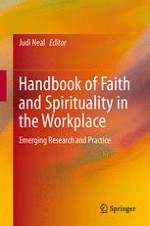2013 | OriginalPaper | Chapter
11. Managing and Leading from a Maori Perspective: Bringing New Life and Energy to Organisations
Authors : Chellie Spiller, Monica Stockdale
Published in: Handbook of Faith and Spirituality in the Workplace
Publisher: Springer New York
Activate our intelligent search to find suitable subject content or patents.
Select sections of text to find matching patents with Artificial Intelligence. powered by
Select sections of text to find additional relevant content using AI-assisted search. powered by
